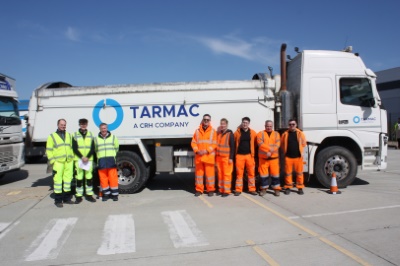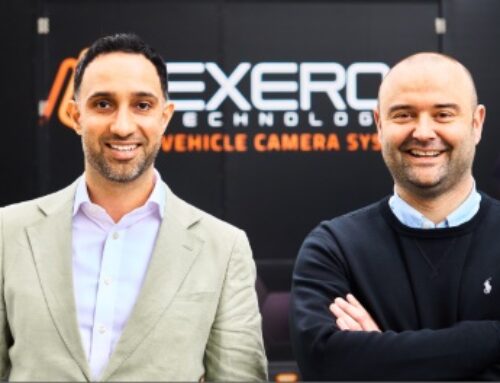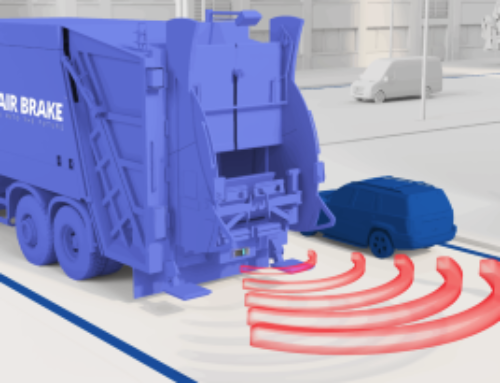Fleete: shared charging hubs are practical solution for electrification
 The news that electrification specialist Fleete has begun work on a major commercial vehicle charging hub at the Port of Tilbury (Transport Operator, April) should come as welcome relief to fleet operators grappling with the challenge of EV transition, the company says.
The news that electrification specialist Fleete has begun work on a major commercial vehicle charging hub at the Port of Tilbury (Transport Operator, April) should come as welcome relief to fleet operators grappling with the challenge of EV transition, the company says.
With completion set for December 2025, Benjamin Dovey, UK sales director at Fleete (pictured, right), says this isn’t just another charging station, but a real-world solution to a problem that’s holding back the transition to electric trucks.
“The largest of the Thames ports, the Port of Tilbury is a key location for major transportation and logistics operations with over 10,000 vehicle movements at port every day,” said Benjamin.
“It is also home to 60 companies registered as tenants that run commercial vehicles, including major hauliers and container transporters.
“While the demand for sustainable transport solutions is more urgent than ever, the port faces key challenges in decarbonising heavy transport. Infrastructure limitations, land availability and limited grid capacity means getting connected can be a long and costly process.
“If it’s a free-for-all, those at the back of the queue could be waiting years or face eyewatering costs for an upgrade. That’s why a shared hub makes sense – it ensures fair and efficient access to charging for everyone who needs it.”
Fleete’s transparent pricing model further strengthens the case for electrification, Benjamin says.
“By passing through base energy costs and charging only a clear, predictable service fee, Fleete gives operators the confidence to forecast accurately and manage costs. In some cases, this means the total cost of running an electric HGV is already competitive with a diesel equivalent – especially for high-utilisation urban and regional duty cycles.”
Believed to be the largest dedicated commercial vehicle electric charging hub in the UK, Fleete’s new shared facility directly addresses these barriers, he contends – providing a reliable, 5 MW high capacity rapid charging solution that serves up to 16 eHGVs at once.
“Electrification is coming, but plugging in is proving to be a challenge,” he continued.
“Some parts of the distribution network are already at capacity, meaning operators looking to install chargers at their depots may face long delays and hefty connection fees. It’s not just about the cost of the chargers themselves – it’s the planning permission, infrastructure upgrades, the cabling, and in some cases, digging up roads just to make it work.
“A shared hub eliminates these headaches. Instead of each business struggling with its own infrastructure, multiple operators can use a centralised facility designed specifically for high-power commercial vehicle charging.”
The new charging hub at the Port of Tilbury will include 12 ultra-fast chargers by Heliox, each delivering up to 360 kW, and four chargers via the Voltempo Hypercharging Megawatt System ensuring rapid turnaround times for HGVs and commercial fleets.
The site will employ smart energy management for fair and efficient sharing of grid capacity between Port of Tilbury tenants, using intelligent energy management systems. Fleete says the site’s prime location will make it easy for fleets operating within and passing through the port to access charging, if signed up to Fleete’s terms and conditions.

Fleete was supported by industry expert Tim Campbell and Tarmac during the design of the Tilbury charging hub
As part of the design process, Fleete collaborated with industry expert Tim Campbell and was supported by Tarmac, who provided three electric trucks and drivers for a full-day layout trial. The test ensured the Tilbury hub design is truly fit for purpose, with safe, efficient access for real-world HGV operations.
Serving as a vital ‘clean fuel’ charging point along the A13 corridor into London, the new facility will also meet rising traffic demands from major developments within the Thames Freeport programme, says Fleete, which is responsible for the design, planning, and operation of the hub.
It’s also the first works funded under the UK Government’s Thames Freeport seed capital programme, which is investing in clean energy to support the drive towards net zero.
“The £1 million Freeport seed capital investment is not just good for the environment – it’s good for business, supporting cleaner air, job creation, and economic growth,” said Benjamin.
“The Port of Tilbury EV Charging hub is a significant step in the right direction, but it’s only the beginning. As more fleets switch to electric, the demand for reliable, high-capacity charging will increase. Shared hubs provide a practical, scalable way forward, helping businesses transition without the challenge of securing individual grid connections.
“Fleete is committed to making electric fleets work in the real world. By providing dependable, cost-effective, and strategically located charging, it is helping operators keep their fleets moving while cutting emissions. Future locations include East Suffolk, North Warwickshire, Staffordshire, Kent and Greater Manchester.”
Benjamin concluded: “Electric trucks are coming. With shared charging hubs like this, they’ll have the infrastructure they need to succeed.”












